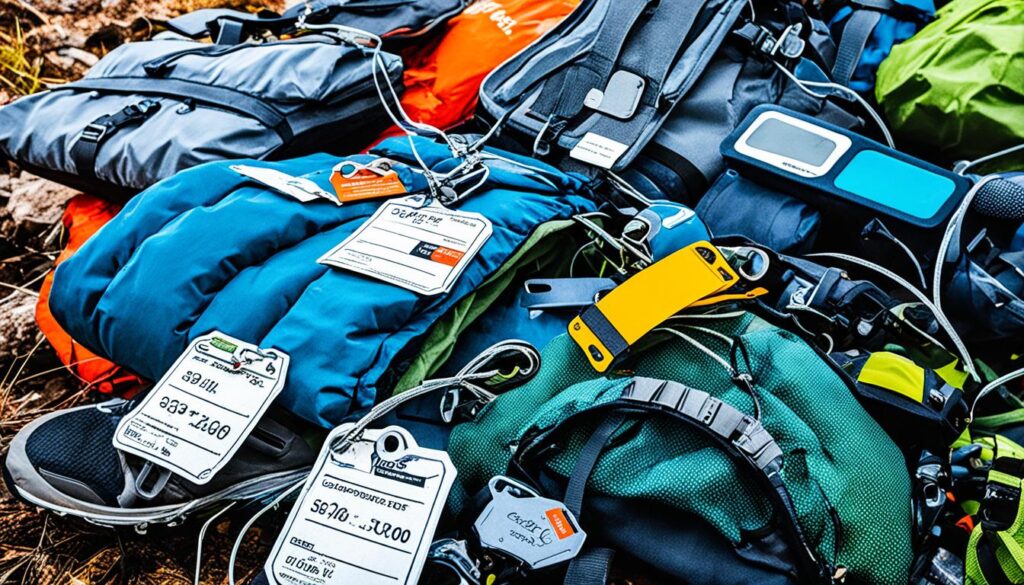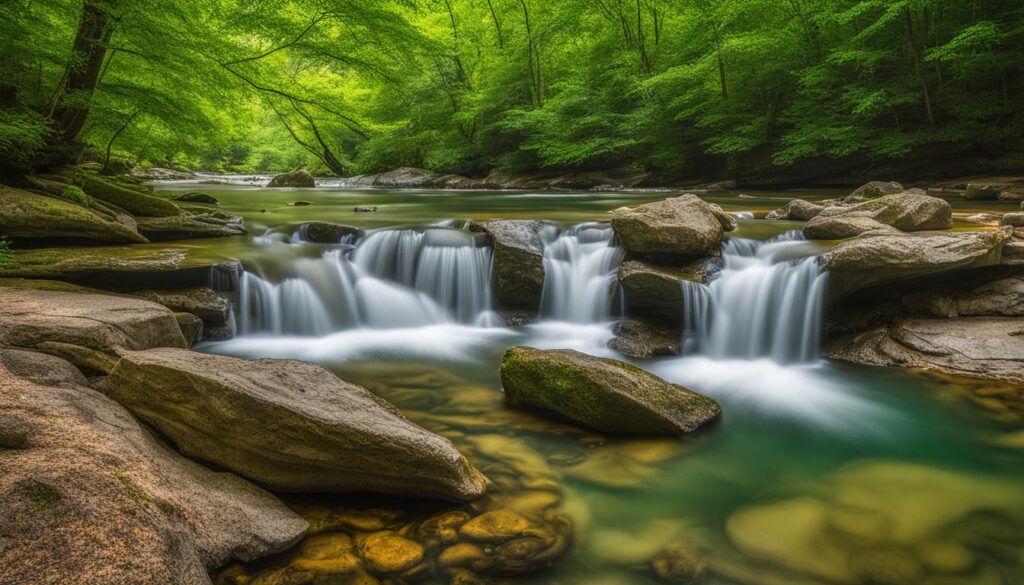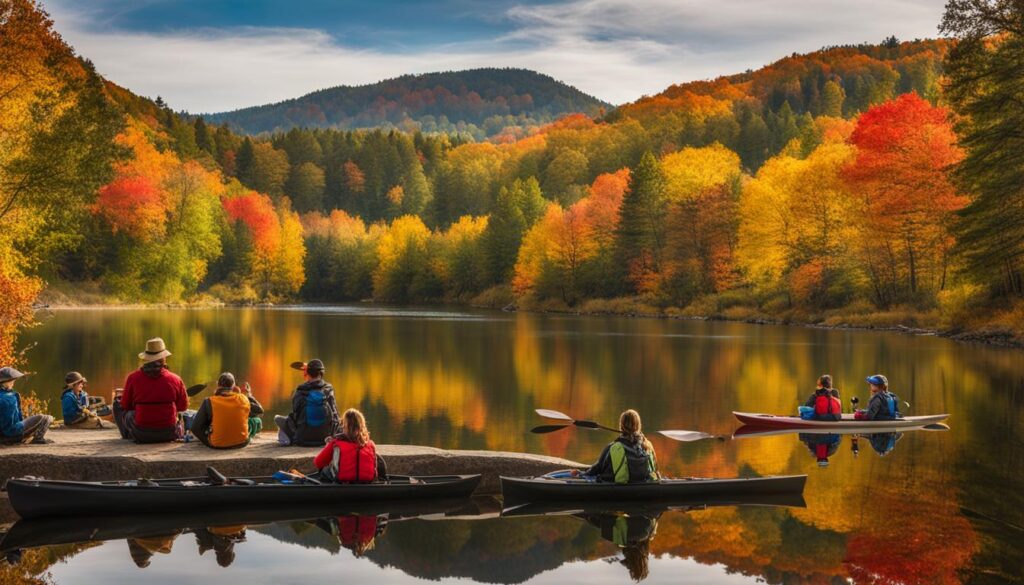Camping is a popular and affordable form of leisure or vacation. Many people enjoy spending time in nature, exploring new places, and creating lasting memories around a campfire. However, it’s important to understand the cost of camping and budget accordingly to ensure a successful and enjoyable trip.
The cost of camping can vary depending on a variety of factors, including the style of camping, location, and duration of the trip. To give you a better idea of what to expect, let’s break down the different expenses you may encounter during your camping adventures.
First and foremost, when planning your camping budget, it’s essential to consider the cost of accommodation. Camping offers various options, from basic tent camping to luxurious glamping setups. On average, campers spend around $50 per person, per day, which includes the cost of their accommodation, food, transportation, activities, and gear.
Next, let’s talk about campground costs. The price of campgrounds can range from $0 to $50 or more per day per group, depending on the amenities offered. Some campgrounds charge per tent, while others charge per person. It’s important to research and compare campground costs to find the best option that fits your budget.
Transportation expenses are another aspect to consider. The cost of traveling to your camping destination can vary depending on the distance and mode of transportation. Road trips are popular among campers, with an average travel distance of 179 miles in recent years. Transportation costs for a typical camping trip can range from $52 to $348, depending on the distance and fuel expenses.
Food costs are an important consideration as well. Bringing your own food can be an affordable option, with an estimated cost of around $11 per person, per day, similar to eating at home. However, if you prefer the convenience of prepared meals or dining out, food expenses can easily exceed $60 per day. It’s essential to plan and budget for food costs based on your preferences and the number of meals you’ll need.
Lastly, let’s not forget about camping gear. Purchasing the necessary camping equipment can be a one-time investment, providing long-term value and savings for future camping trips. The cost of camping gear can vary depending on the quality, brand, and specific items needed. From the bare essentials, which can be purchased for around $170, to luxury glamping setups costing several thousand dollars, there are options to fit every budget.
By understanding the cost breakdown of camping adventures and factoring in these various expenses, you can plan a budget that allows you to fully enjoy your time in nature without breaking the bank.
Key Takeaways:
- The cost of camping can vary depending on factors such as style, location, and duration of the trip.
- On average, campers spend $50 per person, per day.
- Campground costs can range from $0 to $50+ per day per group.
- Transportation expenses can range from $52 to $348 per trip.
- Food costs can range from $11 to $60+ per day per person.
- The cost of camping gear can vary from $170 for the bare essentials to several thousand for luxury glamping setups.
Campground Costs
When planning a camping trip, it’s essential to consider the cost of campgrounds. The expenses associated with campgrounds can vary greatly depending on the amenities offered.
For campers looking for a basic campsite with minimal amenities, barebone campgrounds are a budget-friendly option. These campsites typically cost around $15 to $25 per night, making them suitable for those on a tight camping budget.
If you prefer more comfort and convenience during your camping adventure, campsites with amenities like electrical hookups and WiFi are available at a higher price. These campsites typically range from $20 to $40 per night, providing you with the comforts of home while enjoying the great outdoors.
For RV enthusiasts, RV campsites are equipped with the necessary facilities to accommodate your vehicle. These campsites can range from $25 to $60 per night, depending on the amenities and location.
For a truly luxurious camping experience, glamping setups offer a unique and indulgent escape. Glamping campsites can cost $50 or more per night, providing you with luxurious accommodations and amenities that go beyond traditional camping.
It’s important to note that some campgrounds charge fees based on the number of tents or individuals. Therefore, it’s crucial to research and compare campground costs to find the best option that fits your camping budget.
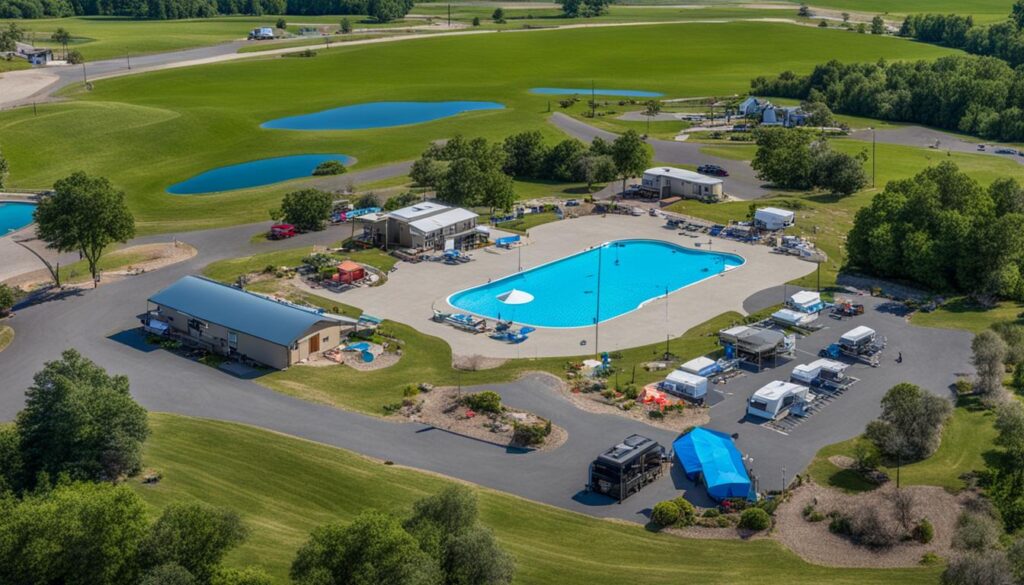
“Researching and comparing campground costs is essential to find the best option that fits your camping budget.”
Transportation Costs
When planning a camping trip, it’s essential to consider transportation costs. The amount you spend on getting to your destination can vary based on factors such as the distance and mode of transportation. Understanding and budgeting for these expenses is crucial to ensure a successful and cost-effective camping adventure.
Choosing Close-to-Home Camping
In 2023, many campers opted for camping close to home to save on transportation costs. Around one-third of campers chose destinations within a reasonable distance, with an average travel distance of 179 miles. By reducing the distance traveled, campers were able to minimize transportation expenses and allocate their budget to other aspects of their camping experience.
The Cost of Road Trips
Road trips are a popular choice among campers, offering flexibility and adventure. Traveling by automobile typically costs an average of 29 cents per gallon, taking into account the price of gas. Depending on the distance traveled, road trip transportation costs for a typical camping trip can range from $52 to $348. This estimation includes fuel expenses and any tolls along the way.
Considerations for Longer Distances or Air Travel
For campers embarking on longer camping trips or traveling from distant locations, transportation expenses can increase significantly. It is important to factor in the extra costs associated with longer distances, such as additional fuel expenses and potential overnight stays along the way. When considering air travel, it is necessary to account for flight tickets, rental cars, or other means of ground transportation to reach your camping destination.
By planning ahead and budgeting for transportation costs, campers can ensure that they allocate sufficient funds for this aspect of their camping adventure. Whether it’s choosing close-to-home camping or considering the expenses of road trips and air travel, understanding transportation costs is vital for a well-prepared and enjoyable camping experience.
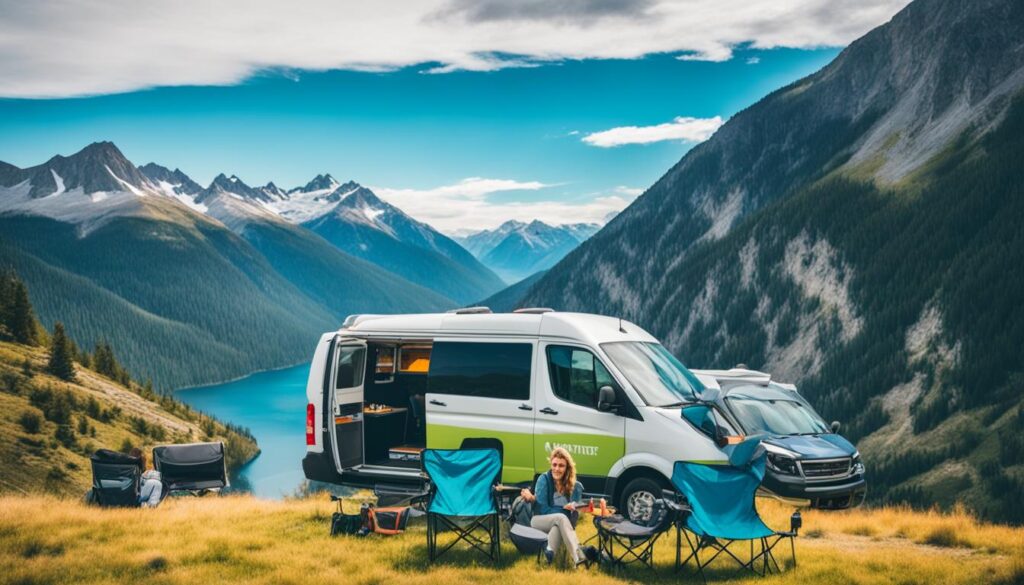
Food Costs
When it comes to camping, food costs can make a significant impact on your overall budget. The amount you spend on food while camping can vary depending on your individual preferences and choices. Let’s take a closer look at different options and their associated costs:
Bringing Your Own Food
One of the most cost-effective options is to bring your own food. By meal planning and packing your supplies, you can keep your food costs as low as $11 per person per day, similar to eating at home. This option allows you to control the menu, portion sizes, and quality of ingredients, ensuring a budget-friendly camping experience. Additionally, packing non-perishable snacks like granola bars and dried fruits can help you save on expensive convenience store items.
Freeze-Dried Camping Meals
If convenience is a priority for you, consider freeze-dried camping meals. These lightweight, easy-to-prepare meals are specifically designed for outdoor enthusiasts. While they offer convenience, they can be slightly more expensive, with costs averaging around $33 per day per person. However, it’s important to note that the variety and quality of freeze-dried meals have improved significantly over the years, providing a tasty and nutritious option for campers.
Eating Out or Prepared Meals
For those who prefer to dine out or opt for prepared meals, food costs can quickly add up. Eating at restaurants or purchasing pre-packaged camping meals can easily exceed $60 per day per person. While this option offers convenience and a break from cooking, it can significantly impact your camping food budget. If you choose this route, it’s essential to factor in dining expenses when planning and budgeting for your camping trip.
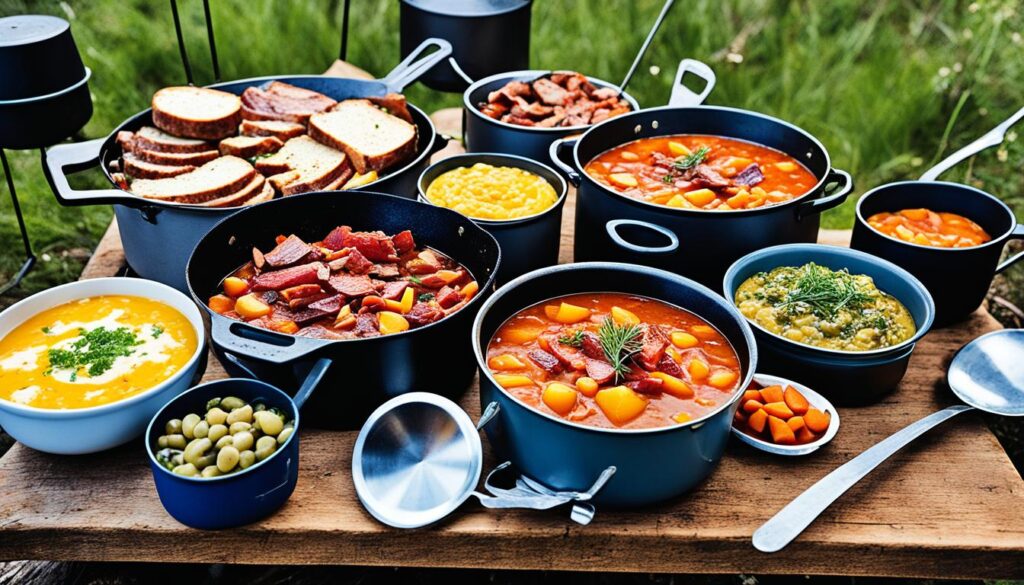
To help you visualize the different food options and their associated costs, here’s a comprehensive table:
| Food Option | Cost per Day per Person |
|---|---|
| Bringing Your Own Food | $11 |
| Freeze-Dried Camping Meals | $33 |
| Eating Out or Prepared Meals | $60+ |
By considering your food preferences, planning your meals, and budgeting accordingly, you can ensure a satisfying and cost-effective camping experience.
Camping Gear Costs
When planning a camping trip, one of the key considerations is the cost of camping gear. The price of camping equipment can vary based on factors such as quality, brand, and the specific items you need. For those on a budget, it’s possible to purchase the bare essentials for around $170 by opting for secondhand gear. However, if you prefer higher-end, new camping gear, you may need to allocate up to $1,540 for your camping essentials.
Of course, the cost of camping gear can increase even further if you choose to add comfort items like camp furniture or opt for luxury glamping setups. These additional items can significantly enhance your camping experience but may also increase the overall cost. In fact, if you decide to indulge in the luxury camping experience, your gear expenses could surpass $4,006 or more.
When planning your camping trip, it’s important to carefully consider the necessary gear and budget accordingly. Keep in mind that while camping gear can be a significant upfront investment, it’s a one-time expense that can provide long-term value and savings for future camping trips. By investing in quality gear, you’ll ensure durability and reliability, allowing you to enjoy the great outdoors with peace of mind.
FAQ
How much does camping cost?
The cost of camping can vary depending on factors such as style of camping, location, and duration. On average, campers spend $50 per person, per day. This includes costs for accommodation, food, transportation, activities, and gear.
What are the campground costs?
Campground costs can range from $0 to $50+ per day per group. The cost of campgrounds can vary greatly depending on the amenities offered, such as electrical hookups, WiFi, and RV accommodations. It’s important to research and compare campground costs when planning a camping trip.
How much do transportation costs for camping trips typically range?
Transportation expenses can range from $52 to $348 per trip. The cost of transportation for a camping trip can vary depending on distance and mode of transportation. Road trips are popular among campers, with an average travel distance of 179 miles and an approximate cost of 29 cents per gallon for automobile travel.
What are the food costs while camping?
Food costs can range from $11 to $60+ per day per person. Bringing your own food can be cost-effective, while prepared meals or dining at restaurants can increase expenses. It’s important to plan and budget for food costs when preparing for a camping trip.
How much does camping gear cost?
The cost of camping gear can vary depending on the quality, brand, and specific items needed. The bare essentials for camping can be purchased secondhand for around $170, while higher-end new gear can cost up to several thousand dollars. It’s important to consider the necessary gear for your camping trip and budget accordingly.
